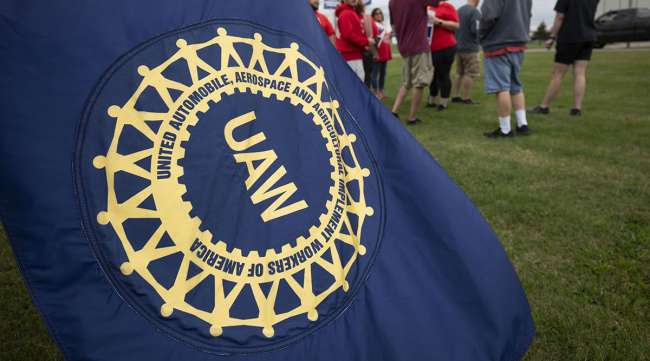GM Reaches Tentative Deal With UAW to End Strike

[Stay on top of transportation news: Get TTNews in your inbox.]
General Motors Co. reached a tentative agreement with the United Auto Workers, according to people familiar with the matter, bringing an end to a 6-week-old strike that had upended U.S. automobile production and cost the industry billions of dollars.
The terms of the pact are broadly similar to the deals signed earlier by Ford Motor Co. and Stellantis NV, including a 25% hourly pay raise plus cost-of-living allowances over the more-than-four-year contract, according to the people, who weren’t authorized to speak publicly. While the economic terms are similar to those reached by GM’s rivals, it wasn’t immediately clear if there were differences in terms including in retiree benefits, which has been a sticking point, according to the people.
GM’s union members still must approve the deal.
The company is the last of Detroit’s legacy automakers to reach an agreement with the union, which began its strike on Sept. 15. Ford’s deal last week put pressure on GM and Stellantis to wrap up their negotiations and get back to work. Stellantis was able to finalize its talks with the UAW on Oct. 28 after agreeing to concessions on job security.
GM’s shares spiked as much as 3.9% in premarket trading on the news before paring the gains. They were little changed at 9:53 a.m. on Oct. 30 during regular trading in New York.
Volvo's Keith Brandis and Eric Bond take an in-depth look at how the company's SuperTruck 2 improves freight efficiency. Tune in above or by going to RoadSigns.ttnews.com.
Last week both GM and Ford pulled their earnings guidance after the strike muddied their outlook. Ford said Oct. 26 that the work stoppage cost the company $1.3 billion. GM said its strike costs had reached $800 million and would cost at least $200 million a week going forward.
This was the first time all three of the Detroit automakers were struck at the same time, a bet by UAW President Shawn Fain to keep them guessing by incrementally adding more plants to the work stoppage. His strategy is paying off with record wage hikes and the restoration of some benefits that the union forfeited during the financial crisis more than a decade ago.
The UAW expanded its walkout at GM on Oct. 28 by calling for another strike at the automaker’s Spring Hill, Tenn., plants. The UAW had previously targeted eight assembly plants and 38 parts-distribution facilities from the three automakers since the strike began, including GM’s Arlington, Texas, facility that makes SUVs and a pickup truck plant in Missouri. The strikes at Ford and Stellantis ended when those companies reached tentative deals with the union.
Want more news? Listen to today's daily briefing below or go here for more info:





